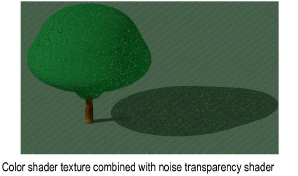 Setting 3D
Existing Tree Appearance
Setting 3D
Existing Tree Appearance Setting 3D
Existing Tree Appearance
Setting 3D
Existing Tree AppearanceThe 3D appearance controls the symbol for the tree and trunk in 3D views. The settings apply to the selected tree or a variety of other selection options, and can be set as the default 3D attributes for the drawing. This is a powerful way to control the 3D appearance of all existing trees in the layer or drawing in one operation. Showing trees in a 3D view is also useful for creating shadow diagrams (Renderworks required).

Using classes for the tree canopy shape and trunk is recommended. The attributes (color or texture) of these elements are easy to control with classes (Renderworks is required to use textures). The class color or texture must be set to Use at Creation. See Classes.
Existing tree symbols are provided as default content (default content is automatically imported into the current file at the point of use and displays in the Resource Browser; see Resource Libraries). The resources in the ET Symbols.vwx file are available in the 3D Properties dialog box.
Image props, such as those provided by xFrog, can be used as 3D tree geometry. However, canopy height and canopy diameter changes in the Object Info palette do not affect the geometry of image props.
To set the existing tree 3D appearance:
1. From the Object Info palette of a selected existing tree, select 3D Properties.
The 3D Properties dialog box opens.
Click to show/hide the parameters.
2. Click OK.
The 3D canopy shape is affected by changes in the Object Info palette for height, diameter, irregular canopy shape, First Branch Hgt, and DBH values.
~~~~~~~~~~~~~~~~~~~~~~~~~
